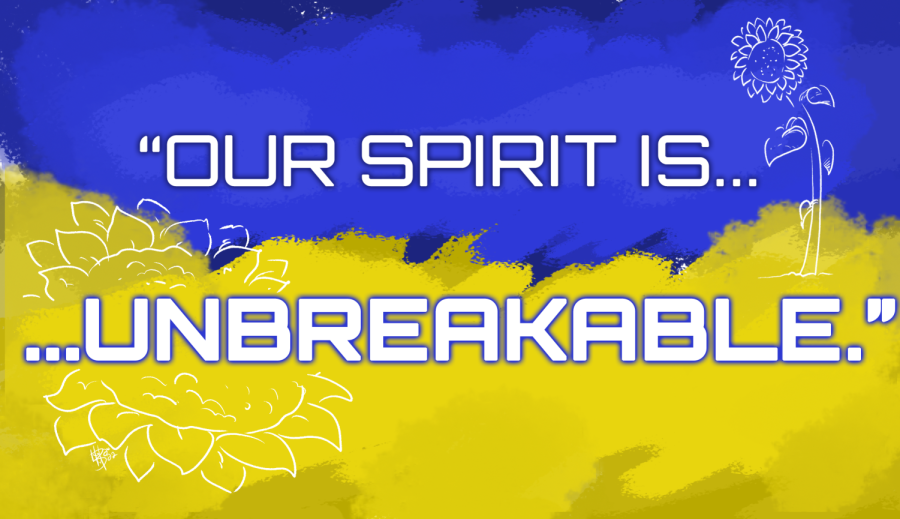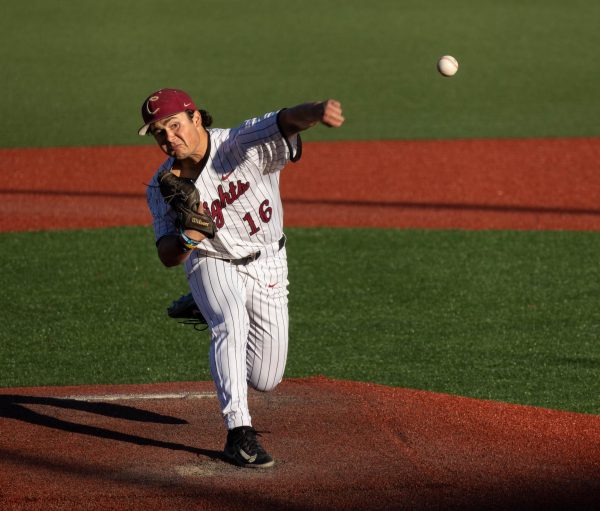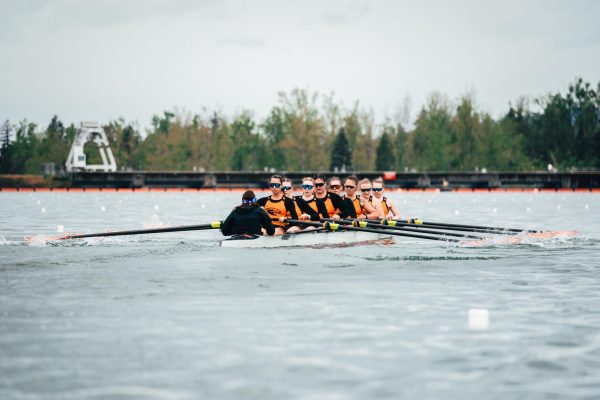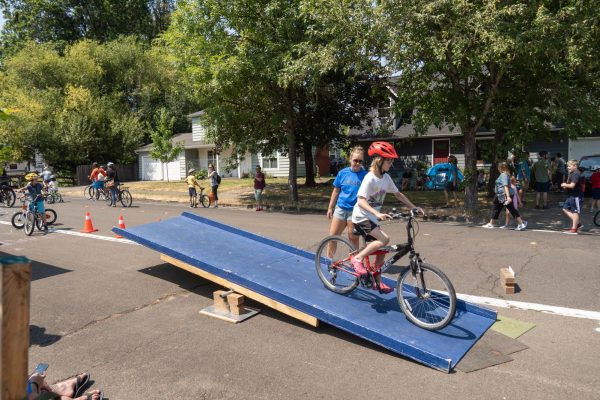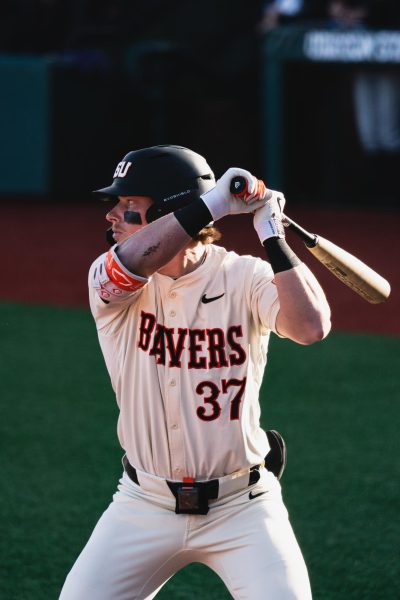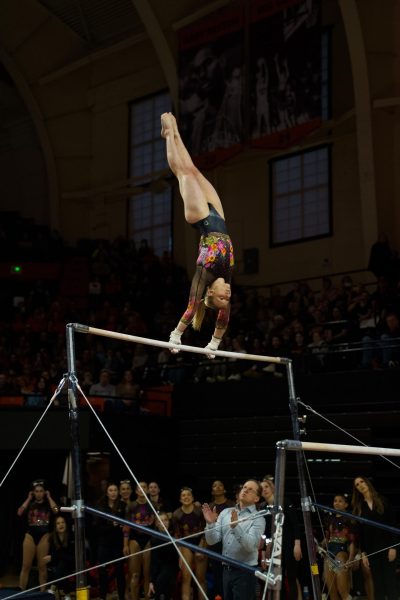‘Our spirit is really unbreakable:’ Sister-city university students offer perspectives on Russian-Ukrainian war
This shows an illustration of the blue and yellow Ukranian flag with text reading “Our spirit is unbreakable.”
June 4, 2022
Two freshman students from Corvallis’s sister-city university, Uzhhorod National University, Sandra Dragostinova and Milla Puziak, have faced challenges maintaining their normal life and education amid war in their home country.
Dragostinova said her family is doing well despite the war, but the Transcarpathian region is a bit overwhelmed by the large number of refugees fleeing to the area.
According to Puziak, goosebumps came over her and she didn’t believe the war could be real when she first heard the air raid sirens in Uzhhorod, and she and her family had to shelter in the kindergarten across the road for three hours. She said it was shocking for her family at first, but they’re doing better now.
“I thought, ‘What a night,’” Puziak said.
Puziak said higher education was disbanded for two weeks at the start of the war and she “reprimanded herself” for not being able to go to the front to fight alongside other Ukrainian soldiers.
“By the way, I shoot quite well,” Puziak said. “So my skills would be quite useful to them. You probably have a question, ‘Weren’t you afraid you might be killed?’ and my answer is no. It’s just impossible to be afraid of something when you see how our heroic army is defending us all… Our spirit is really unbreakable.”
The atmosphere of the war has forced Ukrainians to perceive their reality in a new way, according to Puziak.
“We will lay down ourselves and bodies for our freedom,” Puziak said.
Puziak said the Khozak’s—or Cossacks—translated to ‘free man,’ were the ones who began to liberate Ukrainians from the “yolk” of Russia and Poland starting all the way back in the 13th century.
“The struggle is in our blood, it has been passed down for generations,” Puziak said. “Nothing can stop us, and anyone who thinks [they can] is a naive fool.”
Dragostinova said she thinks people should never forget about their country, no matter where they’re from; it’s easy to be patriotic when things are good but they shouldn’t turn away if their country needs help.
“That’s your mother country, that’s your mother,” Dragostinova said.
Dragostinova said their schoolwork is online at the moment due to the war and the COVID-19 pandemic, and they have refugees living in their dormitories, but students do come together in cafes for some exams.
Dragostinova said she’s studying international economic relations and she likes UNU because it’s her dream to study abroad, in the United States or Canada, and this degree and university are making that happen for her.
According to Dragostinova, her trip to Toronto, Canada revealed that the university experience in North America involves a lot more discussion, while they tend to study and work on projects more in Ukraine. She said a student exchange between UNU and OSU would be exciting and would be a great learning opportunity for students from both countries.
Dragostinova said Ukrainian students have to take tests right after graduating high school in June to determine which universities they can attend.
According to Pete Bober, Corvallis Sister City Association member and former president, Ukrainian students don’t have an option like Linn-Benton Community College to fall back on if the test goes poorly.
“It’s a pretty important milestone,” Bober said. “By the time they’re in eighth or ninth form, they know what the course is for them. They’re not like me who all of the sudden wakes up and I’m done with high school and I said, ‘Oh, I guess I’ll go to community college until I figure out what I want to do.’”
Bober said Ukrainian students also have to apply to specific departments, there’s no exploratory studies like many universities in the U.S. offer.
There are also jobs everywhere in the U.S., according to Puziak, but to get a good job in Ukraine with a good paycheck, or ‘good cabbage’ as they call it, it’s necessary to work hard and get a degree.
According to Puziak, Ukrainians for the most part understand Polish, Belarusian, Slovakian and Russian. Puziak said it’s her dream to speak English and French fluently. She said she wants to learn French because the French president, Emmanuel Macron, is “so handsome.”
Puziak said, for a university language course, students can choose between Polish, German and French. She said her mother thinks she’s crazy for choosing French instead of German, but she wants to learn French and spend summer in Paris.
Dragostinova said she’s always dreamed of studying in an English-speaking country, especially after watching English-language shows and movies.
According to Dragostinova, when things are normal, students do go on some outings like picnics but she was only at school for about a month and a half before the war began and they had to transition to online school. She said the COVID-19 pandemic has also affected their studies and she hopes there will be more time for fun in the future.
Puziak said it’s hard to come to terms with the fact that a lot of plans and dreams have been put on hold or won’t happen at all because of the war.
Dragostinova said there’s also a lot of work to do with the refugees flooding into the Transcarpathian region and many of the locals are volunteering to help. There’s a shortage of necessities like refrigerators, washers and mattresses, she said.
Puziak said the refugees are mostly great people who just want to help, but some do break the law or park their cars in the wrong places, causing frustration for the locals.
According to Dragostinova, some refugees also talk negatively about the Transcarpathian locals, calling them stupid or mocking their religion, but those people are quickly sent abroad to avoid drama and avoid impacting the other refugees.
Bober said 3,500 Ukrainian soldiers from the Transcarpathian territorial defense, Ukraine’s equivalent of the National Guard, were deployed to the front, including professors from UNU.
Dragostinova said soldiers are afraid to go to war because of the lack of equipment, thinking they may be stuck fighting on the front lines in their jeans without any necessities. She said some of her friends have lost their homes and cities and have nothing to return to, particularly in the Donetsk region.
According to Dragostinova, a friend who took supplies to Donetsk sent her a video where there were over 20 tanks that were bombed on the road.
Puziak said she also has friends who woke up to bombs dropping and people are stuck without food or water.
“Just imagine you’re sleeping and you hear the bombs from nowhere and you do not understand what is going on,” Puziak said. “I think the most terrible thing was the panic.”












































































































